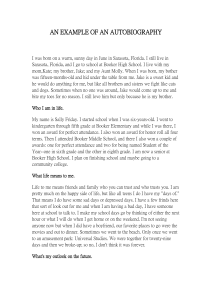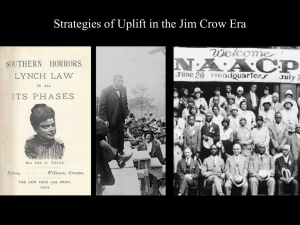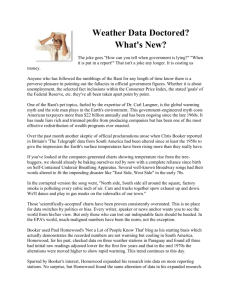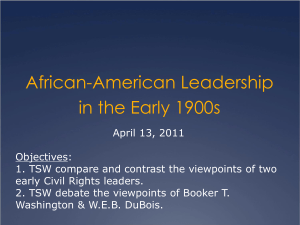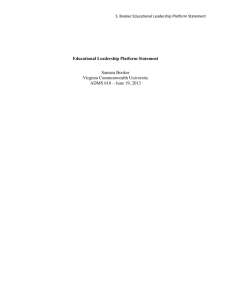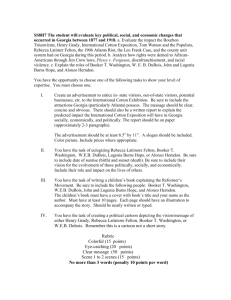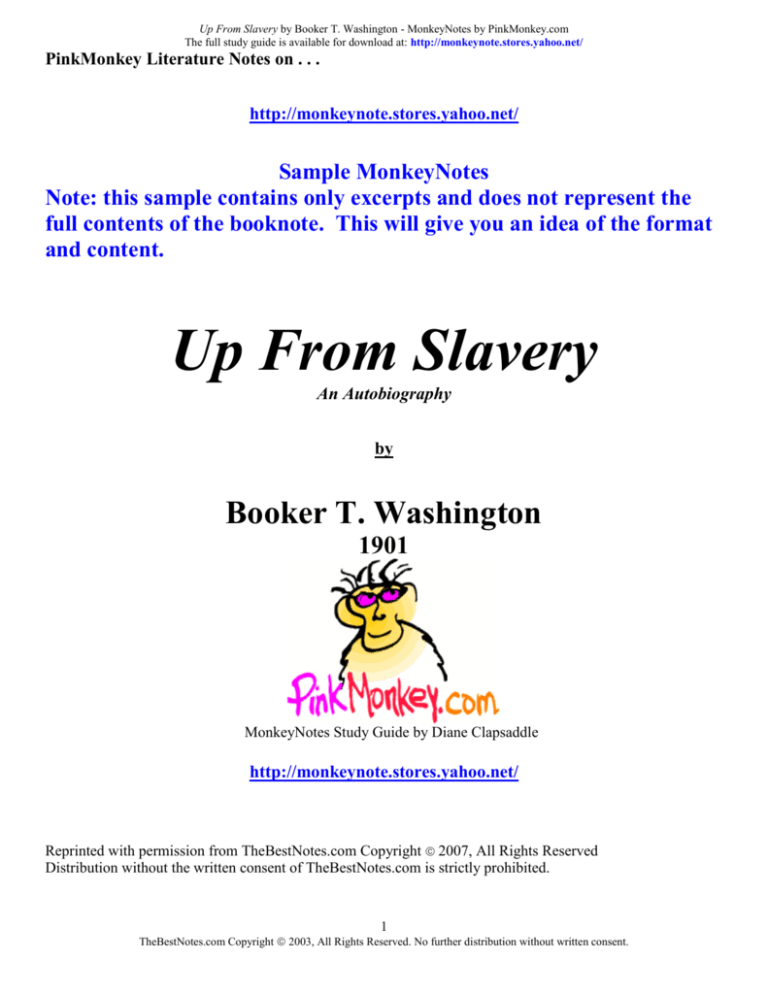
Up From Slavery by Booker T. Washington - MonkeyNotes by PinkMonkey.com
The full study guide is available for download at: http://monkeynote.stores.yahoo.net/
PinkMonkey Literature Notes on . . .
http://monkeynote.stores.yahoo.net/
Sample MonkeyNotes
Note: this sample contains only excerpts and does not represent the
full contents of the booknote. This will give you an idea of the format
and content.
Up From Slavery
An Autobiography
by
Booker T. Washington
1901
MonkeyNotes Study Guide by Diane Clapsaddle
http://monkeynote.stores.yahoo.net/
Reprinted with permission from TheBestNotes.com Copyright 2007, All Rights Reserved
Distribution without the written consent of TheBestNotes.com is strictly prohibited.
1
TheBestNotes.com Copyright 2003, All Rights Reserved. No further distribution without written consent.
Up From Slavery by Booker T. Washington - MonkeyNotes by PinkMonkey.com
The full study guide is available for download at: http://monkeynote.stores.yahoo.net/
KEY LITERARY ELEMENTS
SETTING
Franklin County, Virginia; Malden, West Virginia; Hampton, Virginia; Tuskegee, Alabama; various states in
America and various countries in Europe 1858-1901
LIST OF CHARACTERS
MAJOR CHARACTERS
Booker T. Washington - Because this is his autobiography, his ideas and philosophies, dominate the narrative.
He takes us from his birth to 1901 and shows us all the experiences he had in his journey out of slavery to
dignity.
Booker’s Mother - This character doesn’t actually speak much in the narrative, but she is a very strong presence
because of her influence on her son’s life.
Mrs. Ruffner - Booker comes to work in her house and it’s from her that he learns the value of cleanliness. She
becomes a great friend who gives him support whenever her needs it.
General Samuel C. Armstrong - He is the most dominant influence in Booker’s life. As the founder of the
Hampton Institute, he provides many young Negroes the opportunity for an………
Additional characters are identified in the complete study guide.
CONFLICT
Protagonist - The Protagonist is Booker T. Washington who spends his life trying to lift his people up from
slavery. He perseveres in every endeavor he tries and eventually founds the…….
Antagonist - The Antagonists include: white people whom Booker must win over to ……
Climax - The climax comes with Booker’s address to the Atlanta Exposition. Here, for the first time, a Negro
stands on the same platform as white speakers. It is in this speech where he uses the…….
Outcome - At the end of his autobiography in 1901, Booker believed that there was optimism for his race in
America, and he predicted that the day would come when the races mixed freely and cooperatively. That feeling
was the result of his speech in Richmond, Virginia in a building near where he had……
SHORT SUMMARY (SYNOPSIS)
This autobiography begins with Booker’s recollection of his birth in Franklin County, Virginia, in 1858 or 1895
and follows his progress through his education, his establishment of the Tuskegee Institute, and his fame as a
speaker who presents the importance of good race relations to as many audiences of both……
THEMES
The value of education - The first and most important theme is the value of education. Booker emphasizes this
idea throughout his autobiography, because as a slave, he had been denied the right to learn and once he was
free, like nearly everyone of his race, he soaked up learning like a sponge.
The dignity of work A second important theme is the dignity of work. Booker firmly believed that no
education was complete without learning a trade. He believed that there was tremendous value in work and that
his race would never rise up without being able to work a trade in their communities that……
Additional themes are identified in the complete study guide.
2
TheBestNotes.com Copyright 2003, All Rights Reserved. No further distribution without written consent.
Up From Slavery by Booker T. Washington - MonkeyNotes by PinkMonkey.com
The full study guide is available for download at: http://monkeynote.stores.yahoo.net/
MOOD
Overall, the mood is one of setbacks interspersed with optimism. Washington emphasizes the optimism and
believes that whites and blacks living together in harmony is not only possible, but probable……
BIOGRAPHY OF BOOKER T. WASHINGTON
Although Booker himself was ever unsure of his birth date, it has been determined now that he was born on
April 5, 1856 near Hale’s Ford, Virginia on the Burroughs farm.
He was born into slavery, as his mother was a slave and that made him the property of the same owner. After
Emancipation in 1865, he had to help his poverty-stricken parents by working in the salt mines and the
coalmines of West Virginia. He wanted to go to school so badly that at the age of 16, he walked over two
hundred miles to attend school at the Hampton Institute in Hampton, Virginia. He became a teacher, because he
was convinced that only through education could his race rise up from the burdens of ……
CHAPTER SUMMARIES WITH NOTES / ANALYSIS
PREFACE
Summary
In the preface, Mr. Washington explains how he came to write his autobiography. It came about as an
outgrowth of a series of articles he had written for the magazine Outlook. He received many requests for the
articles to be preserved in book form. He regrets that his book is in such an imperfect form given that he is so
busy with his administrative duties with the Tuskegee Normal and Industrial Institute. He has, however, used
the time whenever he could find it: waiting for trains or in hotel rooms or at such stolen moments between his
duties with Tuskegee. He ends the preface with a thank you for Mr. Max Bennett Thrasher who assisted him in
putting this book together.
Notes
The preface is a wonderful indication of the sincerity and honest motivations of Mr. Washington. It immediately
makes him a likeable man, one deserving of respect for his desire to present his story in a straightforward
manner and to give credit to the man who helped make it possible.
CHAPTER ONE – A Slave Among Slaves
Summary
This chapter begins where it should begin – at the beginning! Or least at the beginning as Booker knew it. He
tells us he was born in Franklin County Virginia, but he is not sure of the year – it’s either 1858 or 1859 – and
he doesn’t know what month or what day. He does know that his birth took place near a crossroads post-office
called Hale’s Ford. Otherwise, his earliest impressions are of the plantation and the slave quarters, the most
miserable, desolate, and discouraging of surroundings. His owners were not especially cruel, at least not as
compared to other owners, but still he was forced to live in a 14 x 16 foot cabin with his mother, his brother,
and his sister.
He knew almost nothing of his ancestry other than the whispers in the quarters about how horrible the voyage
their ancestors had taken from Africa to America. However, that didn’t help him know the history of his own
family. He did know that his mother had a half-brother and a half-sister, but her purchase as a slave attracted
little more attention than the purchase of a cow or pig and there were no records of black people. He also didn’t
know who his father was other than reports that he was a white man who lived on another plantation. His name
was unknown to Booker, but he didn’t hate his father; he merely saw him as just another victim of the
institution of slavery.
His mother was the plantation cook and the kitchen was also where they lived. It was without glass windows,
3
TheBestNotes.com Copyright 2003, All Rights Reserved. No further distribution without written consent.
Up From Slavery by Booker T. Washington - MonkeyNotes by PinkMonkey.com
The full study guide is available for download at: http://monkeynote.stores.yahoo.net/
had a door that barely hung on uneven hinges, and had large cracks in the walls that let in the coldest air in the
winter and the humidity in the summer. The floor was the naked earth. Booker had a distinct memory of a
potato hole in the cabin where sweet potatoes were stored. He was in charge of putting potatoes in or taking
them out and in the process, he was able to snatch a few for himself. All the plantation cooking was done in an
open fireplace, and there was none left for the slaves unless his mother was able to steal a chicken and cook it
for her children late at night. In spite of the fact that taking the potatoes or stealing a chicken might be labeled
as theft, Mr. Washington refused to believe that their actions were wrong given the circumstances of the time.
Like his white father, his mother and he were also victims of the institution of slavery.
Booker had no memory of ever playing games or sports. He regretted that situation, because he believed he
would be an even more useful man if he had. However, his life was devoted to work, because he was slave. He
cleaned yards, carried water, or took corn to the mill. Carrying corn to the mill was the one of the hardest jobs
he ever had. He was small and not very strong and even though he had a horse, if the corn shifted and slipped
off, he had to wait until someone came along to help him put it back, and the time waiting was usually spent
crying. Add to that the fact that he had to walk through the woods alone. He was always frightened, because the
woods were often full of army deserters who were said to cut off the ears of any Negro boy they found there.
Then, if he came home late, he was at the least, severely scolded, and at the worst, flogged. Life was very hard.
As for schooling, as a slave, he had none, but from the earliest he could remember, he ached for the opportunity
to learn. Being able to walk into a schoolhouse would be like walking into paradise for him.
His earliest understanding that he was a slave came when he awoke early one morning and heard his mother
praying that Lincoln and his armies would be successful, and that one day, she and her children would be free.
He was also eternally amazed how a large mass of people like slaves, who were ignorant of books and
newspapers, nonetheless, were completely and accurately informed about “great National questions that were
agitating the country.” He calls it the grapevine telegraph. The news was usually received through the colored
man who was sent to the post office for the mail. He would linger as long as he could to listen in on
conversations of white people congregated there, and in this way, he often brought back news to the slave
quarters before it was even heard in the “big house.”
Booker also had no memories of ever sitting down together at a table with his family to share a meal. Like most
slaves, they ate with their hands, and since food was scarce, they ate quickly to satisfy their hunger. As a result,
when he was sent to the big house at mealtimes to fan flies from the food by means of a large set of paper fans
operated by a pulley, he saw for the first time how a meal could be shared in a genteel way. He also was able to
listen in to their conversations on the subjects of freedom and war and absorb the news that he could tell his
fellow slaves. Furthermore, he saw his masters eating ginger cakes, and the height of his ambition became to
reach a point where he could eat ginger cakes in just the same manner as his owners.
Surprisingly, as the war progressed, the slaves felt it easier to accept deprivation than their white owners did.
They had spent their lives deprived while white people were often in great straits when it came to those things
they took for granted - coffee, tea, sugar, and other articles they were accustomed to.
Booker’s first pair of shoes were wooden – leather on top, but wooden bottoms that made a fearful noise and
made him walk awkwardly. He also had to wear flax shirts, an ordeal that was one of the most trying he ever
faced. It was made from the refuse of the flax, the cheapest and roughest part and pulling it on for the first time
was to him like pulling a tooth. However, he had no choice, because he either wore the flax shirt or he wore
nothing. Fortunately, his brother John often generously offered to wear the shirt to help break it in.
Mr. Washington is quick to pint out at this point in his narrative that one might suppose that he and the rest of
his people would have had bitter feelings towards whites. However, in the case of the slaves on his plantation,
4
TheBestNotes.com Copyright 2003, All Rights Reserved. No further distribution without written consent.
Up From Slavery by Booker T. Washington - MonkeyNotes by PinkMonkey.com
The full study guide is available for download at: http://monkeynote.stores.yahoo.net/
this was not true. In fact, he believed it was not true for most of the black population of the South at that time.
Instead, when one of their young masters was killed in battle, their sorrow was as great as that of the white
family. “Mars Billy” had often begged for mercy for the slaves when they were being flogged or punished as he
cared deeply for them from childhood. The slaves would also stay up around the clock to help nurse their
wounded masters, and when the men were gone to battle, the slaves took upon themselves the serious
responsibility to protect the white women and children with their lives if necessary. It was an honor among the
slaves to be appointed as the ones to sleep in the big house during the absence of the men. All of this, to Mr.
Washington, was a result of the kind and generous nature of the Negro race, which never in his memory would
betray a specific trust. In later years, the former slaves were even known to support and care for their former
masters with gifts of money, food, and time to keep them from suffering. One ex-slave from Ohio had made a
contract with his master two or three years before the Emancipation Proclamation to buy himself by paying so
much per year for his own body. Once freedom came, he still owed his former master $300. Because he was
free, he could have walked away from the debt, but the man walked the greater portion of the distance to
Virginia to finish paying the debt. He had given his word to his master, and he felt his word must never be
broken. He could not have enjoyed his freedom until he had fulfilled his promise.
The generous nature of the Negro slaves was no indication that they really didn’t want to be free. In fact,
freedom was the greatest hope of their lives. However, said Washington, having been slaves or being the
descendents of slaves had made Negroes better than any other black people in the world. He said that
Providence so often uses men and institutions to accomplish a purpose and that it had made Negroes better
people. Furthermore, slavery wasn’t just hurtful to blacks; it was also hurtful to whites who had no spirit or selfreliance and had never mastered a single trade or line of productive industry. They had no idea how to care for
their homes and the refinements of their lives once the slaves were gone so when freedom came, the slaves were
almost as well prepared to begin life anew as their masters.
In the days preceding their freedom, the grapevine telegraph worked overtime and the slaves catered to all the
Yankee soldiers who passed through in order to get vital information about the end of the war. There was more,
bolder singing in the quarters where the word “freedom” in their hymns had been assumed by the white race to
mean death and a glorious meeting with God, but now the true meaning came out. The word “freedom” was the
reality of Emancipation. Then, one morning the slaves were all called to the “big house” where they were told
first by the sadness on the faces of their masters and then by the reading of the Emancipation Proclamation that
they were really free. There was great rejoicing for some minutes, but no bitterness towards their former
owners, and then the reality set in: they were suddenly in charge of themselves and it was a greater
responsibility than they had ever faced before. What was even more sobering was the condition of the old
people – those in their seventies and eighties – who had a strange attachment to their owners. As a result, one by
one, they stealthily wandered to the big house to have whispered conversations with their former masters as to
their future.
Notes
This large chapter is a wonderful exposé of life as a slave and a generous explanation of the relationship
between the slaves and their masters. Booker never shows any bitterness about his life, but instead, explains the
realties for both races, both during slavery and at emancipation.
CHAPTER TWO – Boyhood Days
Summary
The coming of freedom brought two points to the surface with which most Negroes agreed: they needed to
change their names and they needed to leave the plantation for at least a few days to try out their freedom. For
Booker, this meant traveling to West Virginia with mother and siblings, because her husband had secured
employment in the salt mines. They began their journey from Virginia to a little town called Malden about five
miles from Charleston, West Virginia. His stepfather had not only gotten them jobs, but he had also secured a
5
TheBestNotes.com Copyright 2003, All Rights Reserved. No further distribution without written consent.
Up From Slavery by Booker T. Washington - MonkeyNotes by PinkMonkey.com
The full study guide is available for download at: http://monkeynote.stores.yahoo.net/
little cabin for them all. However, in many respects life in that cabin was worst than the slave quarters. They
were crowded very close together and the filth was intolerable. The people were a “motley mix” of colored and
poor, degraded white people. Even young Booker had to go to work at 4:00AM in one of the salt furnaces,
which were filthier than the cabin where they lived.
The first thing he ever learned in the way of book knowledge was in the furnaces. The packers marked their
barrels with certain numbers, and his boss would put an “18” on all his barrels and Booker soon came to learn
his first number symbol. He had an intense desire to learn to read. He finally got his mother to get him a book
and somehow she procured a Webster “blue-back” spelling book. It contained the alphabet and meaningless
phonic sounds, but Booker devoured it. He realized the alphabet would lead to words, and he was determined to
apply it anywhere he could. His mother was the one who shared with him, aided him and abetted him in his
desire. Later, a young colored boy came to Malden, and he knew how to read. At the close of every day’s work,
people who wanted him to read the newspapers to them surrounded him. Booker really envied this boy. Then,
about that time, the questions of opening a school for colored children became the subject of discussion among
the former slaves. The problem was finding a teacher. Not long after, a former colored soldier with considerable
education came to town and the first school opened. The school was open night and day to accommodate work
schedules. For the older people, it was learning to read the Bible before they died. For everyone, though, it was
just the opportunity finally to go to school. Booker, however, was disappointed, because his stepfather could not
afford to allow him to quit working and go to school with the other children. So his mother arranged with the
teacher to give Booker lessons at night. He accepted this arrangement happily, but his boyish desire was to be
just like the other children and go to day school. He finally succeeded in his desire as long as he went to work
before school and after.
Because the school was some distance walk from the furnace, Booker was often late. Work ended at 9:00AM
and school began at the same time. He conceived the idea, as a result, to move the clock hands at work from
8:30 to 9:00AM, and he could leave work earlier. Eventually, the boss locked the clocked face, but this
emphasized Booker’s desire to be at school on time. Another problem he faced was his lack of a cap. All the
other boys wore caps to school, but Booker didn’t have one. Once again, his mother saved the day by taking
two pieces of “homespun” (jeans) and sewing them together to make his first cap. He was inordinately proud of
his mother who didn’t give in to the temptation to go into debt and buy him a store cap. Instead, she came up
with one that he was always proud to wear.
Once he had a cap, he then had another problem: choosing a name. When the teacher asked him his name, he
decided that he was Booker Washington. Later, his mother reminded him that when he was born, she had given
him the name Booker Taliafero, but that the second name had been forgotten. Now, he added it and became
Booker Taliafero Washington. With a cap and a name, he resolved to continue with his desire to create an
ancestry for his children of which they would be proud and which might encourage them to strive even higher.
As a result, knowing that a Negro youth starts out with a presumption of failure against him, he determined that,
day or night, he would get an education. About the same time, his mother adopted into the family another son
who was named James B. Washington.
Booker dreaded working in the salt mines more than anything he did. They were filthy and filled with the
blackest darkness. He feared constantly of getting lost in the mine or his light going out. What’s more, it was
dangerous on just a regular basis. He noted that young boys who began life in a coalmine were often physically
and mentally dwarfed and had no ambition beyond the mines.
At the same time as he was being educated, Booker tried to imagine the feelings and ambitions of a white boy
who had no limit placed upon his aspirations and activities. Under such circumstances, he knew he would begin
at the bottom and keep rising until he reached the “highest round of success.” However, he confessed that he did
not envy the white boy as he once did. He had learned that success is measured not in the position you have
6
TheBestNotes.com Copyright 2003, All Rights Reserved. No further distribution without written consent.
Up From Slavery by Booker T. Washington - MonkeyNotes by PinkMonkey.com
The full study guide is available for download at: http://monkeynote.stores.yahoo.net/
reached in life, but the obstacles you have over come to get there. Out of the struggles he has to overcome, the
Negro youth achieves a strength and a confidence that he would miss if his pathway in life were comparatively
smooth because of his race or birth. Race will not carry one forward unless he has individual worth, and
because of these observations, Booker had come to be very proud of the race to which he belonged.
Notes
This chapter is devoted to Booker’s observations of his boyhood in West Virginia. It emphasizes how important
education becomes for him and shows how he comes to value the race to which he belongs.
CHAPTER THREE – The Struggle for an Education
Summary
One day while at work, Booker overheard two men talking about a school for colored people opening up in
Virginia. He learned that not only was the school established, but opportunities were also provided to work out
the cost of board and at the same time, the student would be taught a trade or some industry. It seemed to him to
be the greatest place on earth and he determined to go to the Hampton Normal and Agricultural Institute in
Virginia. To continue to earn money, he left the salt mines and got a job in the home of General Lewis Ruffner,
the owner of the mines. His wife was a very exacting stern boss, and many young men had………
OVERALL ANALYSES
CHARACTER ANALYSIS
Booker T. Washington - The sheer magnitude of this man shines throughout his autobiography in spite of the
fact that he is very modest about his accomplishments. His life is amazing, because he pulled himself out of the
institution of slavery and was determined to pull his people up with him. He took every opportunity to propose
his ideas and philosophies to all races so that attitudes would change in America. He saw many terrible things
happen to his people, but remained optimistic that, with education and hard work, they could effectively blend
into the dominate white society. He gathered fame through his good works, but never ……
Booker’s Mother - She was an absolutely definitive influence on Booker’s life. She lived nearly all of her life
as a slave, but never gave up hope that the Emancipation would come. She supported Booker in every endeavor
he tried especially his desire for an education. She knew how much wearing a cap to school meant to him and
that in spite of her deep poverty, she found a way to make him one. Booker said ……
Mrs. Ruffner - She was the wife of the owner of the salt mine where Booker worked in Malden, West Virginia.
She became a valuable friend who taught him a great deal about cleanliness and the dignity of work when he
took a position in her home. Other young black men had left her employ because…..
Additional characters are discussed in the complete study guide.
PLOT STRUCTURE ANALYSIS
The author begins with a preface, which explains how he came to write his autobiography and who he thanks
for his help. This is followed by seventeen chapters, which chronologically relate his rise from a life as slave to
his triumph in the areas of education and public speaking. He ends his book……
THEME ANALYSIS
Importance of an education - Throughout the narrative, the main idea expressed is always the importance of
an education. Booker learned this when he was denied it as a slave and later from the example of General
Armstrong. However, in his mind, it wasn’t enough to just study books and learn facts and idea. It was also
important to learn a trade. He believed that if every black citizen conducted himself modestly and worked hard
to learn a trade better than anyone else, he could be satisfactorily integrated into society as a free and
7
TheBestNotes.com Copyright 2003, All Rights Reserved. No further distribution without written consent.
Up From Slavery by Booker T. Washington - MonkeyNotes by PinkMonkey.com
The full study guide is available for download at: http://monkeynote.stores.yahoo.net/
contributing member of it. As a result, he devoted his life to bringing this message to as many people of both
races as he could. He himself so valued his own education that he willingly walked…….
The dignity of work - Another theme, the dignity of work, emphasizes how education and learning a trade go
hand-in-hand. Tuskegee would not admit an student who was not willing to work at……
Additional themes are analyzed in the complete study guide.
AUTHOR’S STYLE
The author’s style is to present life’s story in a very straightforward, simple manner and allow the reader to
come to his own conclusions about him. He feels in this way that he can reach anyone……
RISING ACTION
The rising action begins with chapter one when the reader is introduced to Booker T. Washington through the
narrative of what he knew about his birth until his triumphant speech at the……
FALLING ACTION
The falling action involves the events after the Atlanta Exposition including his trip to Europe and….
POINT OF VIEW
The point of view is first person as it is told from the perspective of Booker himself.
OTHER ELEMENTS
FORESHADOWING
There are several other literary devices that pop up at various times in the story. One of the most prevalent ones
is foreshadowing which frequently presents clues of something that will happen later in the novel. Some
examples of foreshadowing include:
1. He believed that the time would come when the Negro in the South would be accorded all the political
rights which his ability, character, and material possessions entitled him. For the most part this has come
to pass 92 years later…….
IRONY
Another element that is important to note is irony – when something happens, or is seen, or is heard that we
may know, but the characters do not, or that appears opposite of what is expected. Some examples of irony
include:
1. Ironically, given what the reader now knows, Booker’s final assessment that there are no such
organizations as the KKK in the South as he is writing this book is surprising.
2. At the time he was writing this book, Booker felt that his people had begun to…….
IMPORTANT QUOTATIONS - QUOTES AND ANALYSIS
The following quotations are important at various points in the story: (Doubleday and Company, Inc., 1900
1901)
1.
“The picture of several dozen boys and girls in a schoolroom engaged in study made a deep
impression upon me, and I had the feeling that to get into a schoolhouse and study in this way would
be about the same as getting into paradise.”
(pg. 7; here Booker emphasizes how the importance of education was instilled in him at a very early age.)
8
TheBestNotes.com Copyright 2003, All Rights Reserved. No further distribution without written consent.
Up From Slavery by Booker T. Washington - MonkeyNotes by PinkMonkey.com
The full study guide is available for download at: http://monkeynote.stores.yahoo.net/
“…I think it will found to be true that there are few instances, either in slavery or freedom, in which
a member of my race has been known to betray a specific trust.”
(pg. 13; Booker makes this comment as a summation for why the slaves felt no bitterness towards……
2.
SYMBOLISM / MOTIFS / IMAGERY / METAPHORS / SYMBOLS
Other elements that are present in this novel are symbols and metaphors. Symbols are the use of some
unrelated idea to represent something else. Metaphors are direct comparisons made between characters and
ideas. There are many symbols and metaphors used by the author such as:
1.
Being able to walk into a schoolhouse would be like walking into paradise for him.
2.
The grapevine telegraph – the system by which slaves learned the news of the nation – symbolized their
ties to freedom and Emancipation.
3.
When he saw his masters eating ginger cakes the height of Booker’s ambition became to reach a point
where he could eat ginger cakes in just the same manner as his…..
IMPORTANT / KEY FACTS SUMMARY
Title: Up From Slavery: An Autobiography
Author: Booker T. Washington
Date Published: 1901
Meaning of the Title: It refers to Washington’s determination to raise himself out of the mentality of a slave
and raise his people of as well.
Setting: Franklin County, Virginia; Malden, West Virginia; Hampton, Virginia; Tuskegee, Alabama; various
states in America and various countres in …..
STUDY QUESTIONS - MULTIPLE CHOICE QUIZ
1. Booker had no idea when he had been born because
a. slaves were uneducated.
b. records were never kept by black people.
c. slaves were not allowed to know this information.
2. Once the Emancipation occurred Booker and his family
a. traveled to West Virginia to work.
b. stayed on the plantation.
c. took jobs in salt mines in Ohio…….
ANSWER KEY
1.) b 2.) a 3.) c 4.) a 5.) c 6.) b 7.) c 8.) c 9.) a 10.) c 11.) a 12.) b 13.) c 14.) a 15.) c
ESSAY TOPICS - BOOK REPORT IDEAS
1. Explain Booker’s ideas about education and work by citing examples from the autobiography.
Why did he take up public speaking and how successful was he? Why was the Atlanta Exposition speech so
important?……
END OF SAMPLE MONKEYNOTES EXCERPTS
http://monkeynote.stores.yahoo.net/
Copyright ©2007 TheBestNotes.com.
Reprinted with permission of TheBestNotes.com. All Rights Reserved.
Distribution without the written consent of TheBestNotes.com is strictly prohibited.
9
TheBestNotes.com Copyright 2003, All Rights Reserved. No further distribution without written consent.


